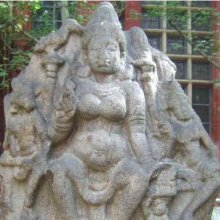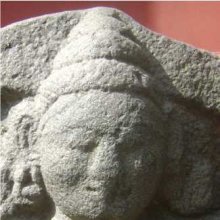Jyeshtha, Jyeṣṭha, Jyeṣṭhā: 34 definitions
Introduction:
Jyeshtha means something in Buddhism, Pali, Hinduism, Sanskrit, Marathi, Hindi. If you want to know the exact meaning, history, etymology or English translation of this term then check out the descriptions on this page. Add your comment or reference to a book if you want to contribute to this summary article.
Jyeshtha has 33 English definitions available.
The Sanskrit terms Jyeṣṭha and Jyeṣṭhā can be transliterated into English as Jyestha or Jyeshtha, using the IAST transliteration scheme (?).
Alternative spellings of this word include Jyeshth.
Images (photo gallery)
Languages of India and abroad
Sanskrit dictionary
[Deutsch Wörterbuch]
Source: Cologne Digital Sanskrit Dictionaries: Böhtlingk and Roth Grosses Petersburger WörterbuchJyeṣṭha (ज्येष्ठ):—
--- OR ---
Jyeṣṭha (ज्येष्ठ):—
1) a) von den aufsteigenden Eimern am Schöpfrade (Gegens. kaniṣṭha) [Spr. 4080.] [Z. 8 lies 17, 30 Stenzler 17, 28.] —
3) g) vgl. dazu [Taittirīyabrāhmaṇa Comm. 2, 367, 12] und u. d. W. lakṣmī . —
5) c) Nomen proprium eines Liṅga [Oxforder Handschriften 44,a,5 v. u.]
Source: Cologne Digital Sanskrit Dictionaries: Sanskrit-Wörterbuch in kürzerer FassungJyeṣṭha (ज्येष्ठ):—und jyeṣṭha (insbes. in der Bed. der älteste ; auch dreisilbig) —
1) Adj. — a) der vorzüglichste , vornehmste , praecipuus , obenan stehend , der oberste , erste , beste , grösste , schlimmste ; Subst. princeps , primores. Mit pada oder mūla greatest root , the square-root which is extracted from the quantity so operated upon. — b) vorzüglicher als (Abl.). — c) der älteste ; m. der älteste Bruder. —
2) m. — a) (sc. ghaṭa) der aufsteigende Eimer an einem Brunnenrade [Indische sprüche 2429.] — b) ein best. Monat (richtiger jyaiṣṭha). — c) Nomen proprium eines Mannes. —
3) f. jyeṣṭhā — a) die älteste Ehegattin [195,29.196,1.] Auch *die am meisten bevorzugte Gattin oder Geliebte. — b) Sg. und Pl. das 15te (18te) Mondhaus. — c) das achte Jahr im zwölfjährigen Jupitercyclus. — d) *Mittelfinger. — e) *eine kleine Hauseidechse. — f) ein best. Saiteninstrument [Saṃgitasārasaṃgraha 185.] — g) die ältere Schwester der Lakṣmī. — h) Elend , Unglück. — i) eine best. Śakti [Hemādri’s Caturvargacintāmaṇi 1,611,5.] — k) *Beiname der Gaṅgā [Rājan 14,17.] —
4) n. — a) das Oberste , Erste , Haupt. — b) *Zinn. — c) Name eines Liṅga. — d) in Verbindung mit puṣkara = jyeṣṭhapuṣkara. —
5) jyeṣṭham Adv. am meisten , sehr.
Sanskrit, also spelled संस्कृतम् (saṃskṛtam), is an ancient language of India commonly seen as the grandmother of the Indo-European language family (even English!). Closely allied with Prakrit and Pali, Sanskrit is more exhaustive in both grammar and terms and has the most extensive collection of literature in the world, greatly surpassing its sister-languages Greek and Latin.
See also (Relevant definitions)
Starts with (+73): Jyeshtha-adhikaranika, Jyeshtha-devara, Jyeshtha-kayastha, Jyeshtha-pita, Jyeshthabala, Jyeshthabandhu, Jyeshthabharya, Jyeshthabharyya, Jyeshthabhavika, Jyeshthabrahmana, Jyeshthadama, Jyeshthadevi, Jyeshthaganesha, Jyeshthagaura, Jyeshthaghni, Jyeshthagranthi, Jyeshthagrihya, Jyeshthajaghanya, Jyeshthakalasha, Jyeshthakanishtha.
Ends with (+10): Agnijyeshtha, Ajyeshtha, Anujyeshtha, Anvagjyeshtha, Balajyeshtha, Bhurijyeshtha, Brahmajyeshtha, Devajyeshtha, Indrajyeshtha, Janmajyeshtha, Kalajyeshtha, Kamajyeshtha, Kashyapasunujyeshtha, Kavijyeshtha, Lingajyeshtha, Lokajyeshtha, Mantrajyeshtha, Manujyeshtha, Pakshijyeshtha, Pragjyotishajyeshtha.
Full-text (+456): Jyeshthashvashru, Anujyeshtha, Jyeshthamuliya, Ajyeshtha, Jittha, Jyeshthavritti, Jyeshthavarna, Jyaishtha, Kavijyeshtha, Jyeshthashrama, Jyeshthamula, Jyaishthasaman, Jyeshthapushkara, Surajyeshtha, Varnajyeshtha, Jyeshthatata, Jyeshthata, Snanayatra, Yathajyeshtham, Vadapunava.
Relevant text
Search found 100 books and stories containing Jyeshtha, Jyeṣṭha, Jyeṣṭhā, Jyestha, Jyēṣṭha, Jyēṣṭhā; (plurals include: Jyeshthas, Jyeṣṭhas, Jyeṣṭhās, Jyesthas, Jyēṣṭhas, Jyēṣṭhās). You can also click to the full overview containing English textual excerpts. Below are direct links for the most relevant articles:
Women in the Atharva-veda Samhita (by Pranab Jyoti Kalita)
7b. Hymn for a Son, Born at an Unlucky Star < [Chapter 2 - The Strīkarmāṇi Hymns of the Atharvaveda]
Rig Veda (translation and commentary) (by H. H. Wilson)
Rudra-Shiva concept (Study) (by Maumita Bhattacharjee)
2. Vājasaneyi-saṃhitā (a): Physical appearance of Rudra < [Chapter 2 - Rudra-Śiva in the Saṃhitā Literature]
3. Epithets of Rudra-Śiva tracked in the Āraṇyaka literature < [Chapter 6b - Epithets (References)]
1. Epithets and Attributes of Rudra-Śiva (Introduction) < [Chapter 6a - The Epithets of Rudra-Śiva]
Brihat Samhita (by N. Chidambaram Iyer)
Chapter 23 - On rain (pravarṣaṇa)
Chapter 22 - On rain support days (garbha-dhāraṇa)
Early Chola Temples (by S. R. Balasubrahmanyam)
Temples in Sembiyan Mahadevi < [Chapter VIII - Temples of Uttama Chola’s Time]
Ashta Parivara Devatas < [Chapter XIII - Prasada: Component Parts]
Temples in Erumbur (Urumur) < [Chapter II - Temples of Parantaka I’s Time]
Temples of Munnur (Historical Study) (by R. Muthuraman)
Images of Jeshta (Jyestha) < [Chapter 5]
Related products





